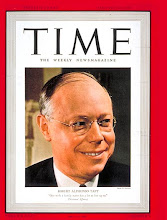When it was founded in 1955, "National Review" magazine adopted the slogan "Standing athwart History yelling stop!" hoping they could do something about the leftward and statist lurch happening in postwar America. Its founder was 29-year-old William F. Buckley, Jr., who stormed onto the scene in 1951 with his controversial classic "God and Man at Yale." The magazine was meant to be a conservative alternative to the liberalism that was beginning to dominate the country.
Its early contributors included Russell Kirk, Frank Meyer, James Burnham, Whitaker Chambers, and various other members of the Buckley brood. Mostly regarding Communism, "National Review" also wrote about culture, immigration, and domestic politics. For years it was the reliable source for conservatives who otherwise did not have an outlet for their beliefs. The magazine had a profound impact on a generation of conservatives.
However, by the 1970s the magazine began a slow downward spin to where the publication now resides. The addition of the neoconservatives from the Left marked the beginning of the end for "National Review" as a conservative magazine. It eventually became a magazine of the Republican establishment. In 1956, instead of formally endorsing him, "National Review" announced that they "preferred Ike." In the 1980s they still criticized President Reagan from the Right. By 2008, tepid criticism of the Republican primary field led to full-fledged enthusiasm for the John McCain campaign. But their hypocrisy neither begins nor ends with enthusiasm for Mr. McCain.
David Frum, one-time speechwriter for President George W. Bush, devoted a legendary smear piece to conservatives who opposed the then-impending invasion of Iraq. Entitled "Unpatriotic Conservatives," it served as the cover story for the March 19, 2003 issue. Mr. Frum proceeded to write out, or attempt to write out such landmark conservatives as Pat Buchanan, Taki Theodoracopulos, Robert Novak, and lesser known figures such as Justin Raimondo and Lew Rockwell from the conservative movement for opposing a war they felt was doomed to fail and not in America's interests. Mr. Frum not only rejected any dissent from the official presidential agenda, but equated conscientious objection to the war with treason. Opposing the Iraq War was racist, according to Mr. Frum. Does defending the federal government at every turn make one a conservative or a liberal? Until President Bush came around, unquestioned support of the government was considered liberal.
An even more recent example: the June 30 issue of this year featured a review by David Pryce-Jones of Pat Buchanan's most recent book "Churchill, Hitler, and the Unnecessary War." In it, Mr. Pryce-Jones made only personal attacks on Mr. Buchanan and accused the latter of being nothing short of a Nazi (for a long time I thought it was liberals who accused conservatives of being Nazis when they disagreed with them). For another example of "National Review" and their treatment of the aforementioned Pat Buchanan book, I direct you to Victor Davis Hanson's equally ignorant review. Feel free to read Mr. Buchanan's book and then the reviews and you will likely scratch your head about the reviewers' sloppy conclusions. There is no conclusive evidence that either of them actually read the book -- only that Mr. Buchanan departed from the officially-approved interpretation: Hitler=total evil, anyone who fought against Hitler=total good.
So what does this tell us? It is quite obvious that "National Review" long ceased to be a conservative magazine. From these few incidents, and my recent review of Jonah Goldberg's contributions to "conservatism," it looks like the publication's main objective is the suppression of any dissent from officially-approved Republican orthodoxy. This is an absolute repudiation of Mr. Buckley's original revolution. While it is true that some of the problems the conservative movement faces now are the fault of Mr. Buckley, mainly that he left the door open for the neoconservatives to take a prominent position in his movement, but the movement is unrecognizeable now from the one that hit the scene in the mid-1950s.
All the conservative apostasy is completed by their full support of John McCain. During the never-ending primary season the magazine assured its readers that they would support the party's nominee, whoever it was. Language and promises like that essentially make "National Review" useless as any sort of repository of conservative opinion. No one can honestly believe that Senator McCain is conservative. So why support him? To stay in the good graces of the Republican Party? After all, the senator represents big government and endless war. What's conservative about that?
Like much of talk radio, "National Review" is little more than a Republican Party cheerleader. They espouse conservative opinions when it's convenient. Honestly speaking, the publication was mildly tolerable throughout 2007 because its writers were frequently criticizing the primary field over their conservative credentials. Now that it's 2008 and it's McCain vs. Obama, everybody is jumping on board the "Stop Obama Express," even if it means supporting a candidate whose voting record is not much more conservative that Mr. Obama's and a year ago was the scourge of true conservatives.
Following the Bush administration, the Republican Party stands in ruin. The party which "National Review" vociferously defended may be headed toward monumental defeat. Now might be time for the editorial board to consider whether trading their principles in order to have a spot next to the power class was worth it after all.
Friday, July 18, 2008
Subscribe to:
Post Comments (Atom)















No comments:
Post a Comment